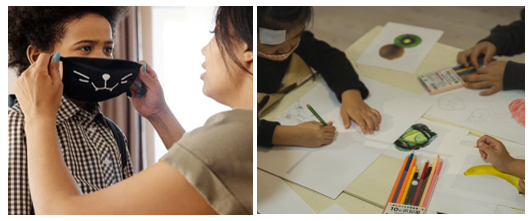Child level
I participate… Because I am entitled to: Participation rights in time of pandemic
This blog post was contributed by Nadine Correia (ISCTE-IUL).

Participation rights are enshrined in the Convention on the Rights of the Child [1] and constitute one of the 3Ps (Provision, Protection, Participation). In fact, from an early age, children have the right to express their ideas on matters pertaining to them, having them considered where appropriate, and according to their age and maturity. In exceptional or emergency situations, such as the one we have been experiencing, children’s participation should not be neglected [2].
Children’s ideas and experiences during the pandemic – 5 aspects from a study
A study promoted by the British Association Froebel Trust and developed in partnership with the Birmingham Centre for Research Early Childhood, sought to give visibility to the perspectives of children aged between 2 and 4, and to the views of their teachers, regarding the COVID-19 pandemic. We selected 5 aspects highlighted by this study:
- Children’s detailed knowledge of the virus, with children being able to describe it and enumerate its effects (including health hazards), but also the steps needed to combat it (such as wearing a mask and handwashing).
- Children’s resilience and adaptability to the changes caused by the pandemic, although many children expressed satisfaction when returning to their routine, in their ECEC setting, and in close contact with their peers.
- The importance of play, with some changes observed in children’s play, such as a greater appreciation of outdoor spaces and children’s involvement for longer and more focused periods of play.
- The importance of mother tongue, as children who spoke more than one language resorted more often to early childhood education and care (ECEC) professionals who also spoke their mother tongue.
- Different forms of expression by children regarding the virus and their experiences during the pandemic, depending on their characteristics and preferences – sharing through stories, music, drawings, photographs or even through silence.
3 reasons to promote children’s participation and listen to their perspectives, in ECEC
Children must be able to influence the various decisions that affect their lives, from an early age [3]. However, children’s participation rights are still the least assured [4]. We recall three reasons for listening to children and seeking to know their ideas and experiences on issues that concern them, specifically in the ECEC context:
- ECEC settings are fundamental for children’s development, and the exercise of participation is described as an important criterion for quality of these settings [5]. In Europe, under non-exceptional circumstances, around 95% of children spend, on average, around 30 hours per week in ECEC settings [6]. For this reason, it is crucial to children’s needs, expectations, opinions, and suggestions, encouraging their participation in the most diverse activities and circumstances [7].
- ECEC professionals are described as gatekeepers, that is, educational agents responsible for ensuring children’s access to participatory experiences [8]. In other words, their role is fundamental to ensure the creation of conditions and opportunities for children to express themselves, to be heard, and to influence matters concerning to them [9], in the varied daily situations.
- Participation benefits are recognized, not only for children, but also for adults and institutions [10]. Listening to children and considering their perspectives regarding the current situation can contribute not only to their well-being, but also for adults and institutions to better understand their experiences and to adopt practices and strategies that meet children’s needs and interests.
How have you ensured children’s participation, heard and considered their perspectives, during this period of response to the COVID-19?
In what activities have children been more or less involved? What levels of participation have you been able to ensure? Have children been informed about possible activities and projects? Have they been consulted on decisions that affect the functioning of the ECEC setting? Have they collaborated and acted in partnership with adults, or had the opportunity to take the initiative and present their own proposals?
References
[1] United Nations Organisation (1989). United Nations Convention on the Rights of the Child. New York: United Nations. [2] Eurochild (2020). Growing up in lockdown: Europe’s children in the age of COVID-19. 2020 Eurochild Report. Brussels: Eurochild. Available at https://www.eurochild.org/resource/growing-up-in-lockdown-europes-children-in-the-age-of-covid-19/ [3] Council of Europe (2021). Listen – Act – Change: Council of Europe handbook on children’s participation for professionals working for and with children. Strasbourg: Council of Europe. Available at https://rm.coe.int/publication-handbook-on-children-s-participation-eng/1680a14539 [4] Such, C. (2014). History and development of children’s rights. In M. Kanyal (Ed.), Children’s rights 0-8: Promoting participation in education and care (pp. 7-25). New York, NY: Routledge. [5] Sheridan, S. (2007) Dimensions of pedagogical quality in preschool. International Journal of Early Years Education, 15(2), 197-217. doi:10.1080/09669760701289151 [6] European Commission/EACEA/Eurydice (2019). Key Data on Early Childhood Education and Care in Europe – 2019 Edition. Eurydice Report. Luxembourg: Publications Office of the European Union. [7] Lopes da Silva, I., Marques, L., Mata, L., & Rosa, M. (2016). Orientações Curriculares para a Educação Pré-Escolar [Guidelines for Preschool Education). Lisbon: Ministry of Education, Directorate-General of Education. Available at https://www.dge.mec.pt/orientacoes-curriculares-para-educacao-pre-escolar [8] Gal, T. (2017). An ecological model of child and youth participation. Children and Youth Services Review, 79, 57-64. doi:10.1016/j.childyouth.2017.05.029 [9] Lundy, L. (2007). ‘Voice’ is not enough: Conceptualising article 12 of the United Nations Convention on the Rights of the Child. British Education Research Journal, 33(6), 927–942. doi:10.1080/01411920701657033 [10] Sinclair, R. (2004). Participation in practice: Making it meaningful, effective and sustainable. Children & Society, 18, 106–118. doi:10.1002/chi.817Useful links
You must be logged in to post a comment.

